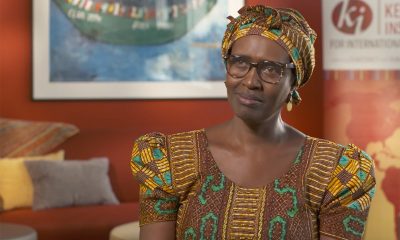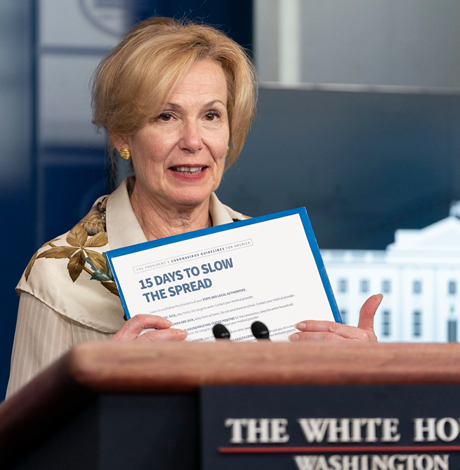Arts & Entertainment
Welcoming the world
Activists, filmmakers prepare for Int’l AIDS Conference with busy lineup of local events
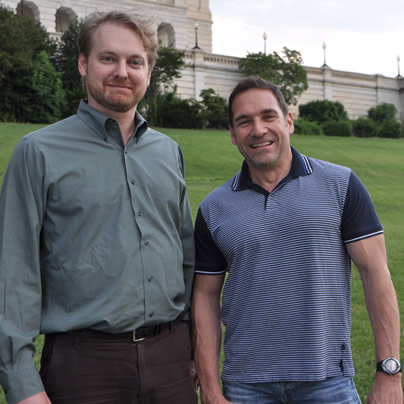
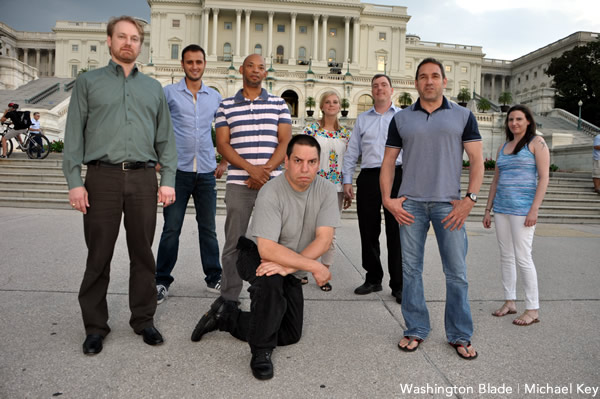
Members of the World AIDS Institute team (l-r): Chad Johnson, Diego Alves, Noel Short, David Miller, Angela Kelly, Kevin Maloney, Dave Purdy and Mariel Selbovitz. (Washington Blade photo by Michael Key)
As Washington gears up to host the International AIDS Conference for the first time in 22 years, local organizations have planned a bounty of free or independent events for those who could not afford the $150-$1,045 registration fee.
Global Village, an international organization that brings together leaders, researchers and performers from all over the world to increase awareness of HIV/AIDS, is hosting several sessions within the conference ranging from video screenings and art exhibitions to networking zones and meeting rooms. Everything the Global Village is hosting is free and open to delegates and locals.
“We are trying to connect science, research and community,” coordinator Joseph Elias says. “It is important that the D.C. community participates to get a grasp of what is happening locally and globally.”
Several of the events will be geared toward youth under the age of 30 dealing with HIV/AIDS.
Emily Carson, youth program coordinator at Global Village, says the focus on youth has been in demand.
“Young people are disproportionally affected by HIV,” she says. “In the conference in 2000, there were only 50 young people, and they said this is a severe problem, no one is speaking for us.”
Among the many attractions in the Global Village area, there will be an interactive story telling booth called, “Generations HIV.” The booth looks like a photo booth, but it records video instead.
The booth was created by Marc Smolowitz and Jörg Fockele, both San Francisco-based filmmakers, as part of their HIV Story Project. The booth has been featured three times in the San Francisco Bay area and has so far collected about 250 clips. The HIV Story Project is a non-profit organization that compiles multi-platform story telling and short films about living with HIV/AIDS.
“The booth is a conversation starter,” Smolowitz says. “It is to connect different generations of people living with HIV. You can ask questions of different generations, answer questions or record your personal story.”
Smolowitz and Fockele are currently trying to start an archive online where all the videos will be posted.
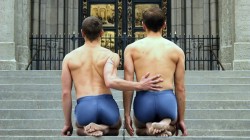
A still from ‘Ours,’ one of the films being screened July 24-25 in the AIDS Film Festival. (Image courtesy the Festival)
Along with the booth, the HIV Story Project team also has a movie screening at the International AIDS Film Festival, which is occurring in conjunction with the conference from July 24-25. The film is titled, “Still Around,” and is a compilation of 15 short films portraying different people living with HIV/AIDS in the San Francisco area. The people were paired with 16 different directors and had direct say in their own films. The films vary, and include stories about how people are thriving with the disease. One subject is a man who copes with his HIV-positive status through a hooking ritual. Another is a couple that marries, has a daughter and faces HIV/AIDS together.
Fockele says the film is an update of what the face of HIV/AIDS looks like in the U.S. and in Europe today.
“In Europe and the U.S. there are mostly historic films about HIV and AIDS,” he says. “What we went out to do is to get a film that is right here, right now.”
The movie is opening the festival on July 24 at 7 p.m. Tickets are $10, and a pass for all four films is $25. For more information about the International AIDS Film Festival 2012, visit internationalaidsfilmfestival.org.
The film festival and several other community events are a part of the AIDS2012 Reunion, a resource for conference attendees to see what local events are taking place outside the main conference.
“The one thing we are doing is we are allowing anyone to participate,” managing director David Purdy says. “Low-income people are one group that needs support and to get educated about HIV/AIDS.”
Some of the events in the AIDS2012 Reunion as well as other community events include:
• On July 20-21, the DC Center, National Coalition of LGBT Health, Whitman-Walker Health and Us Helping Us at George Washington University (2029 G St., N.W.) are hosting the Gay Men’s Health Summit. Registration is $85, $65 for students.
• On July 21, Jay Brannan is playing at the U Street Music Hall (1115A U St., N.W.) at 7 p.m. Tickets are $20.
• From July 21-27, the Textile Museum (2320 S St., N.W.) is showing a special display of one panel from the AIDS Quilt. An $8 donation is suggested.
• On July 22, there’s a March on Washington involving several different local organizations from noon to 2 p.m.
• On July 19 and 23, Arena Stage (1101 6th St., S.W.) hosts a benefit performance of its current production, the Larry Kramer-penned AIDS classic “The Normal Heart” at 8 p.m. Tickets are $65.
• On July 24, “Return to Lisner: A Forum on the State of HIV/AIDS,” is taking place at the Lisner Auditorium at George Washington University (2029 G St., N.W.). Registration is required.
For more events, visit the AIDS2012 Reunion website aids2012reunion.org.
These events are only a fraction of what will be occurring throughout the D.C. Metropolitan area.
Chris Dyer, organizer for the Gay Men’s Health Summit, says by hosting separate events from the conference, organizations can make them more focused on certain groups.
“Gay men’s health issues are unique,” he says. “The main conference deals with a variety of issues, but we are providing a safe place for gay, bisexual or trans men to talk about their specific issues in a safe place.”
Purdy also says that organizations like AIDS2012 Reunion bring the focus back to what is happening locally and connecting people to services they may not be aware of.
“We’re providing an opportunity to participate and win this war against AIDS,” he says.
Bringing the spotlight back to Washington, local filmmakers Art Jones and Pam Bailey are also presenting their documentary “13 Percent,” which is about how the African-American population in Washington and other metropolitan areas has been affected by HIV/AIDS in the past 10 years. The movie will be screening at Bloombars (3222 11th St., N.W.) on July 24 at 7 p.m. RSVP and $10 donation is suggested.
The film is intermixed with interviews from medical professionals, political leaders, religious leaders and those living with the virus. They showcase a variety of people affected by the disease and their stories, one of the most compelling being a young woman named Raven.
Raven was born with HIV and when her mother informed the Catholic school she was attending, Raven began facing daily discrimination from teachers and students. She describes how one teacher put garbage bags around her and would bar her from going on class trips. All of this occurred well after it was known how the virus is spread.
“I am hoping [the audience] take away the recognition that we are a community that is really threatened,” Jones says. “This film should be a call to action.”
He hopes this would lead to more exposure of how much of a threat HIV remains.
Purdy wishes similar things for attendees of the conference and the different community events.
“Really, I hope people have a new commitment or a recommitment to work together in this fight,” he says. “I would like them to share stories and remember the 30 million who have died from AIDS worldwide. There is a lot of work that needs to be done.”
Movies
Radical reframing highlights the ‘Wuthering’ highs and lows of a classic
Emerald Fennell’s cinematic vision elicits strong reactions

If you’re a fan of “Wuthering Heights” — Emily Brontë’s oft-filmed 1847 novel about a doomed romance on the Yorkshire moors — it’s a given you’re going to have opinions about any new adaptation that comes along, but in the case of filmmaker Emerald Fennell’s new cinematic vision of this venerable classic, they’re probably going to be strong ones.
It’s nothing new, really. Brontë’s book has elicited controversy since its first publication, when it sparked outrage among Victorian readers over its tragic tale of thwarted lovers locked into an obsessive quest for revenge against each other, and continuing to shock generations of readers with its depictions of emotional cruelty and violent abuse, its dysfunctional relationships, and its grim portrait of a deeply-embedded class structure which perpetuates misery at every level of the social hierarchy.
It’s no wonder, then, that Fennell’s adaptation — a true “fangirl” appreciation project distinguished by the radical sensibilities which the third-time director brings to the mix — has become a flash point for social commentators whose main exposure to the tale has been flavored by decades of watered-down, romanticized “reinventions,” almost all of which omit large portions of the novel to selectively shape what’s left into a period tearjerker about star-crossed love, often distancing themselves from the raw emotional core of the story by adhering to generic tropes of “gothic romance” and rarely doing justice to the complexity of its characters — or, for that matter, its author’s more complex intentions.
Fennell’s version doesn’t exactly break that pattern; she, too, elides much of the novel’s sprawling plot to focus on the twisted entanglement between Catherine Earnshaw (Margot Robbie), daughter of the now-impoverished master of the titular estate (Martin Clunes), and Heathcliff (Jacob Elordi), a lowborn child of unknown background origin that has been “adopted” by her father as a servant in the household. Both subjected to the whims of the elder Earnshaw’s violent temper, they form a bond of mutual support in childhood which evolves, as they come of age, into something more; yet regardless of her feelings for him, Cathy — whose future status and security are at risk — chooses to marry Edgar Linton (Shazad Latif), the financially secure new owner of a neighboring estate. Heathcliff, devastated by her betrayal, leaves for parts unknown, only to return a few years later, with a mysteriously-obtained fortune. Imposing himself into Cathy’s comfortable-but-joyless matrimony, he rekindles their now-forbidden passion and they become entwined in a torrid affair — even as he openly courts Linton’s naive ward Isabella (Alison Oliver) and plots to destroy the entire household from within. One might almost say that these two are the poster couple for the relationship status “it’s complicated.” and it’s probably needless to say things don’t go well for anybody involved.
While there is more than enough material in “Wuthering Heights” that might easily be labeled as “problematic” in our contemporary judgments — like the fact that it’s a love story between two childhood friends, essentially raised as siblings, which becomes codependent and poisons every other relationship in their lives — the controversy over Fennell’s version has coalesced less around the content than her casting choices. When the project was announced, she drew criticism over the decision to cast Robbie (who also produced the film) opposite the younger Elordi. In the end, the casting works — though the age gap might be mildly distracting for some, both actors deliver superb performances, and the chemistry they exude soon renders it irrelevant.
Another controversy, however, is less easily dispelled. Though we never learn his true ethnic background, Brontë’s original text describes Heathcliff as having the appearance of “a dark-skinned gipsy” with “black fire” in his eyes; the character has typically been played by distinctly “Anglo” men, and consequently, many modern observers have expressed disappointment (and in some cases, full-blown outrage) over Fennel’s choice to use Elordi instead of putting an actor of color for the part, especially given the contemporary filter which she clearly chose for her interpretation for the novel.
In fact, it’s that modernized perspective — a view of history informed by social criticism, economic politics, feminist insight, and a sexual candor that would have shocked the prim Victorian readers of Brontë’s novel — that turns Fennell’s visually striking adaptation into more than just a comfortably romanticized period costume drama. From her very opening scene — a public hanging in the village where the death throes of the dangling body elicit lurid glee from the eagerly-gathered crowd — she makes it oppressively clear that the 18th-century was not a pleasant time to live; the brutality of the era is a primal force in her vision of the story, from the harrowing abuse that forges its lovers’ codependent bond, to the rigidly maintained class structure that compels even those in the higher echelons — especially women — into a kind of slavery to the system, to the inequities that fuel disloyalty among the vulnerable simply to preserve their own tenuous place in the hierarchy. It’s a battle for survival, if not of the fittest then of the most ruthless.
At the same time, she applies a distinctly 21st-century attitude of “sex-positivity” to evoke the appeal of carnality, not just for its own sake but as a taste of freedom; she even uses it to reframe Heathcliff’s cruel torment of Isabella by implying a consensual dom/sub relationship between them, offering a fragment of agency to a character typically relegated to the role of victim. Most crucially, of course, it permits Fennell to openly depict the sexuality of Cathy and Heathcliff as an experience of transgressive joy — albeit a tormented one — made perhaps even more irresistible (for them and for us) by the sense of rebellion that comes along with it.
Finally, while this “Wuthering Heights” may not have been the one to finally allow Heathcliff’s racial identity to come to the forefront, Fennell does employ some “color-blind” casting — Latif is mixed-race (white and Pakistani) and Hong Chau, understated but profound in the crucial role of Nelly, Cathy’s longtime “paid companion,” is of Vietnamese descent — to illuminate the added pressures of being an “other” in a world weighted in favor of sameness.
Does all this contemporary hindsight into the fabric of Brontë’s epic novel make for a quintessential “Wuthering Heights?” Even allowing that such a thing were possible, probably not. While it presents a stylishly crafted and thrillingly cinematic take on this complex classic, richly enhanced by a superb and adventurous cast, it’s not likely to satisfy anyone looking for a faithful rendition, nor does it reveal a new angle from which the “romance” at its center looks anything other than toxic — indeed, it almost fetishizes the dysfunction. Even without the complex debate around Heathcliff’s racial identity, there’s plenty here to prompt purists and revisionists alike to find fault with Fennell’s approach.
Yet for those looking for a new window into to this perennial classic, and who are comfortable with the radical flourish for which Fennell is already known, it’s an engrossing and intellectually stimulating exploration of this iconic story in a new way — and for cinema fans, that’s more than enough reason to give “Wuthering Heights” a chance.
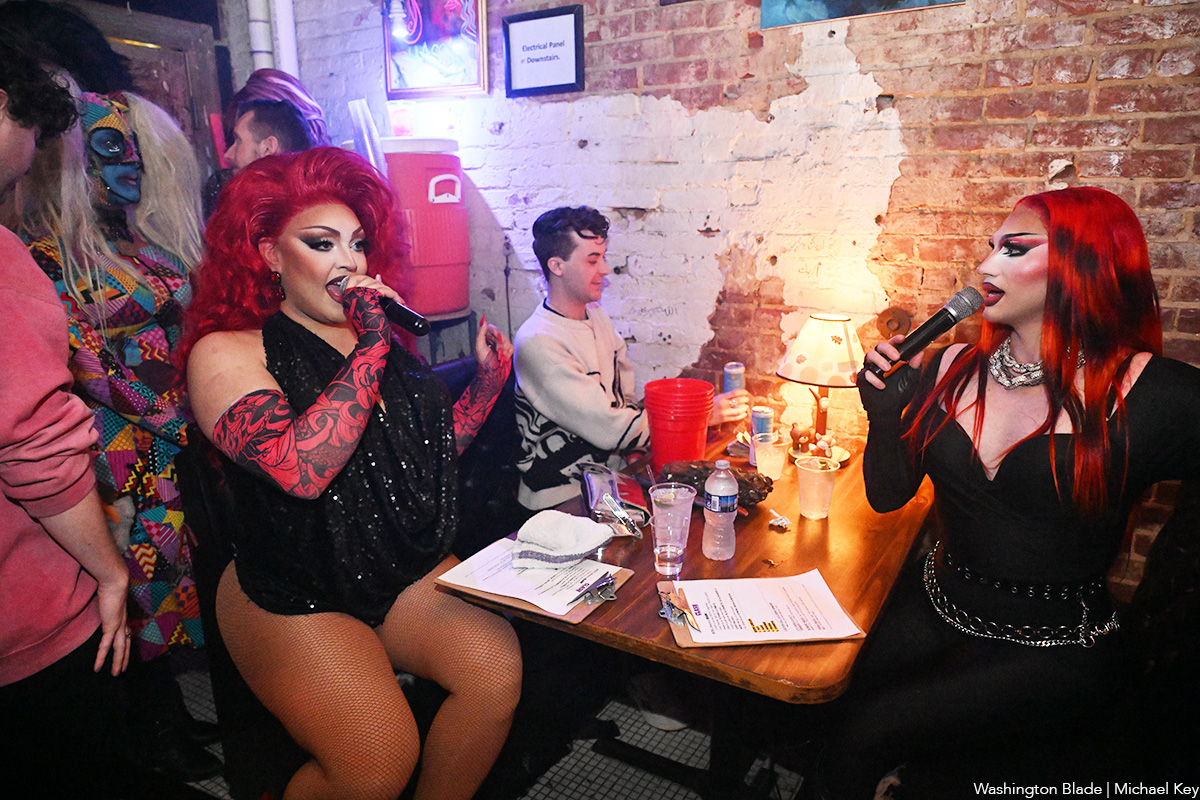
Crimsyn and Tatianna hosted the new weekly drag show Clash at Trade (1410 14th Street, N.W.) on Feb. 14, 2026. Performers included Aave, Crimsyn, Desiree Dik, and Tatianna.
(Washington Blade photos by Michael Key)
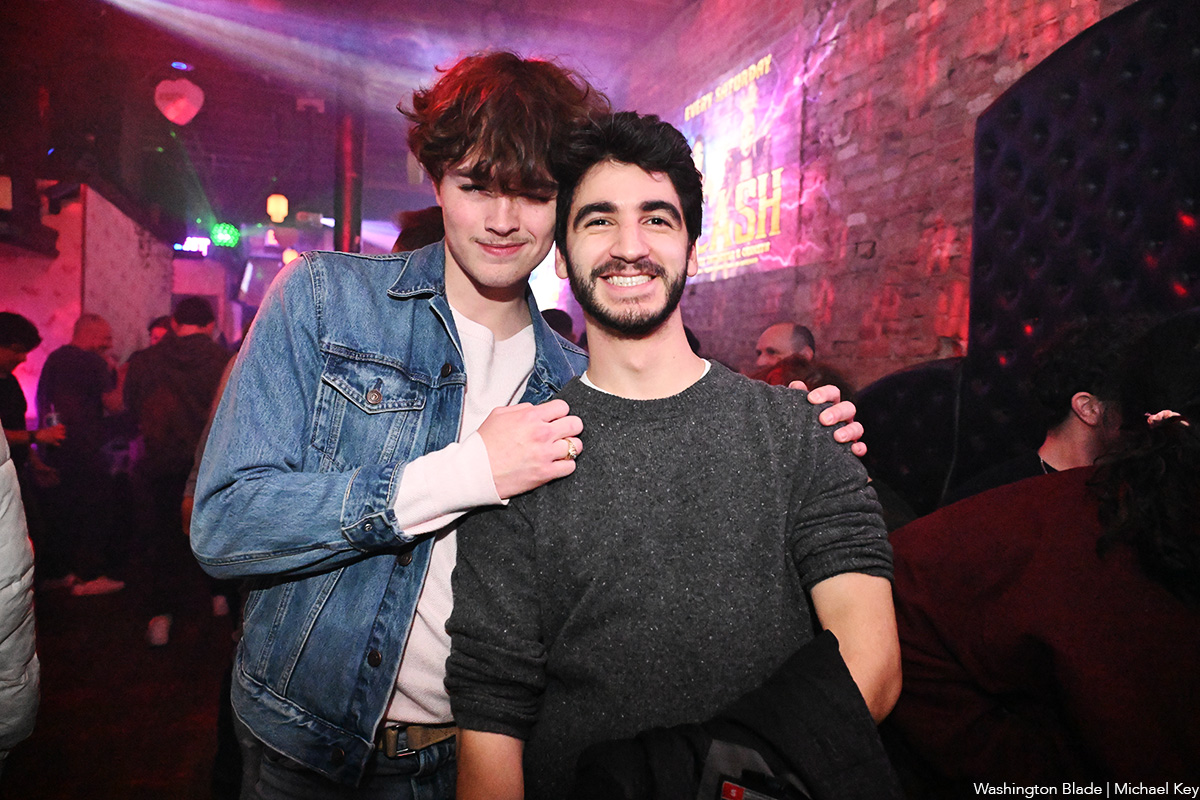
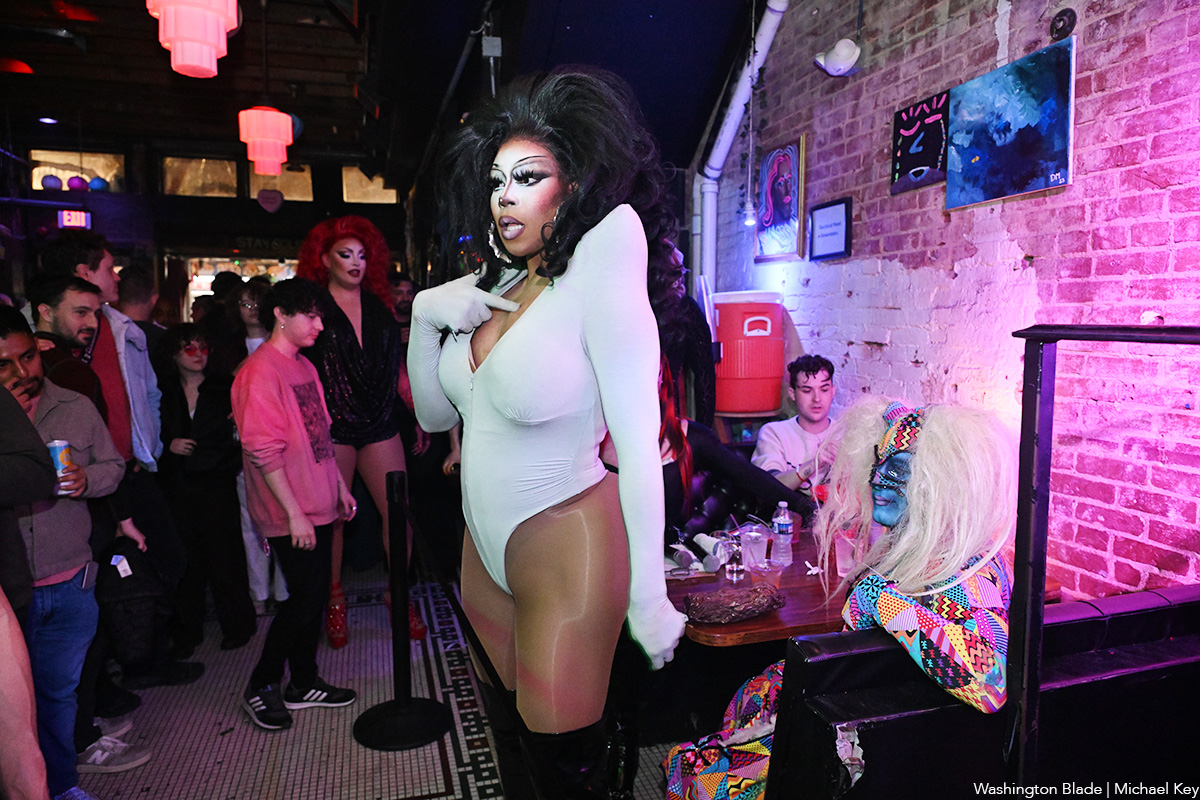
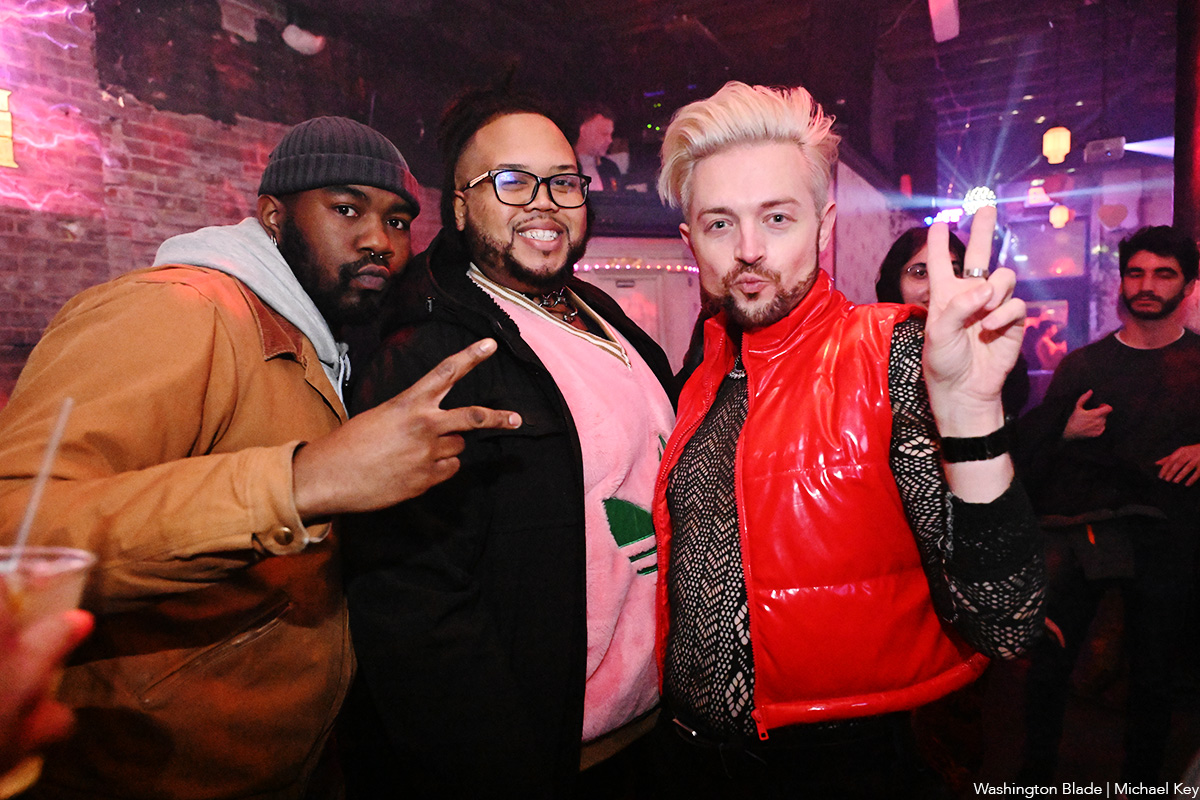
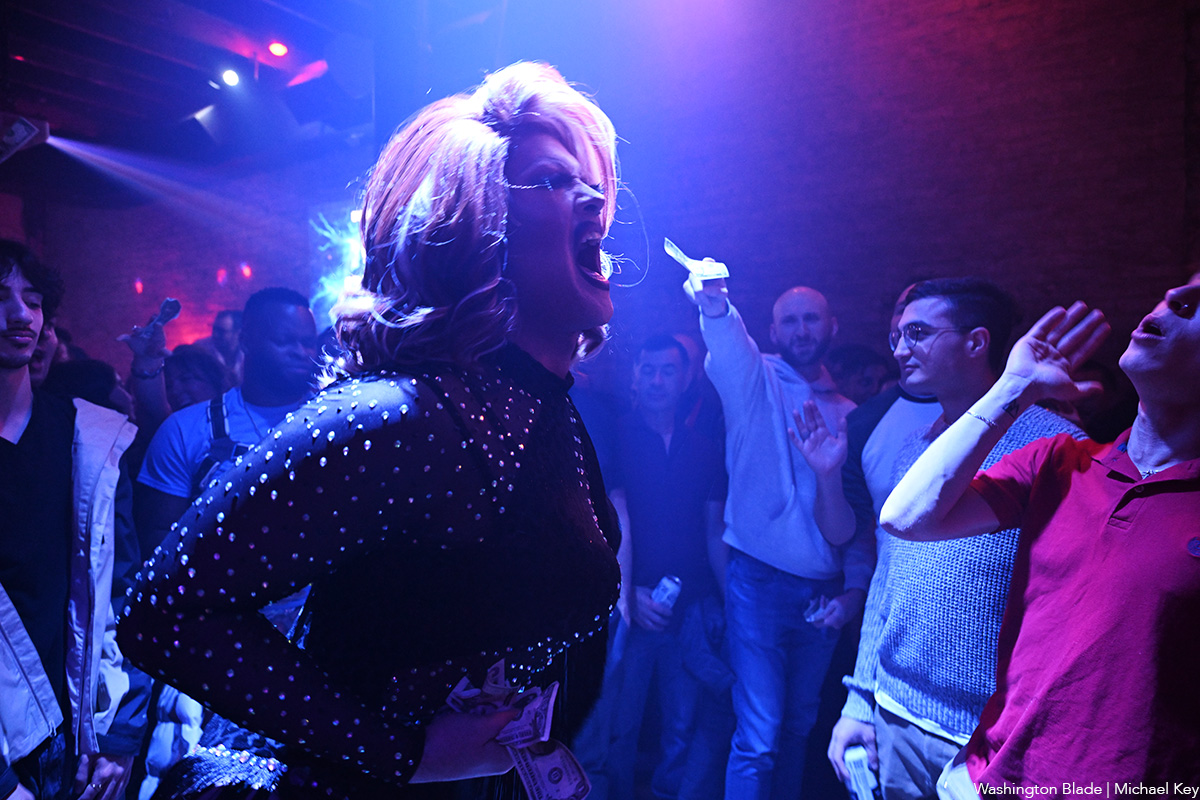
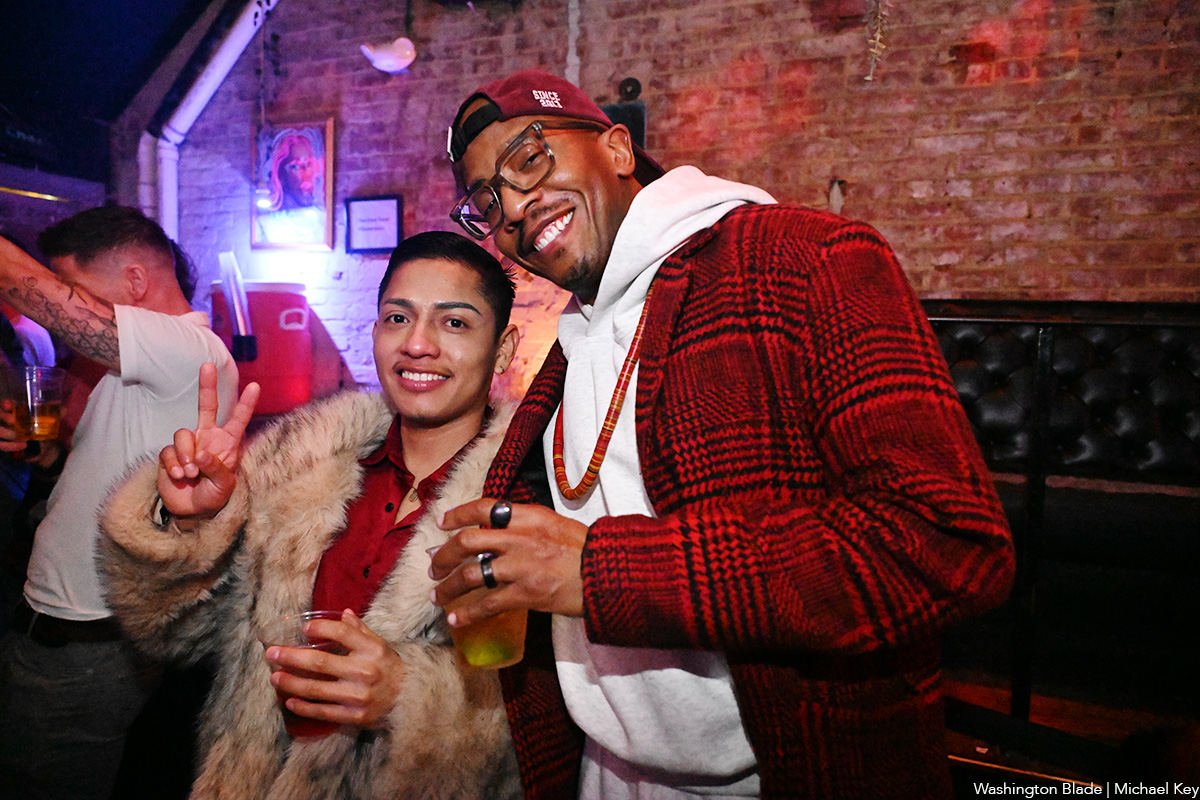
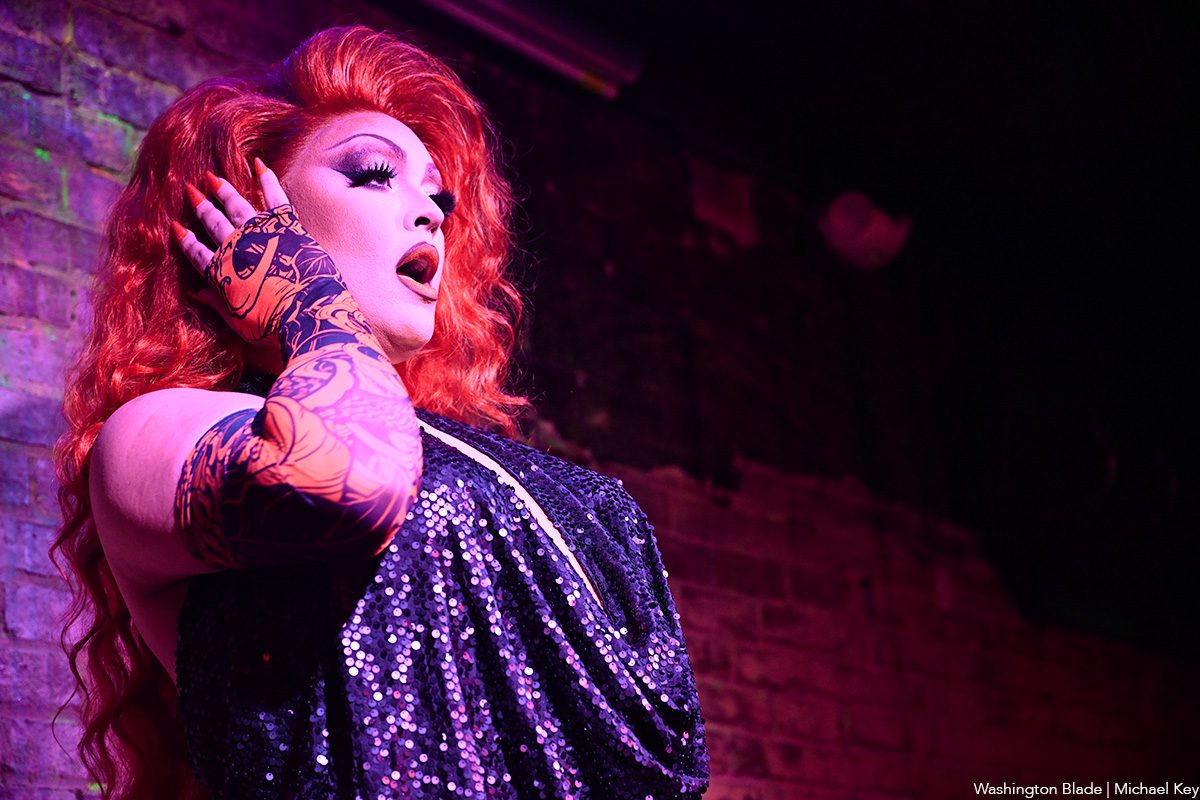
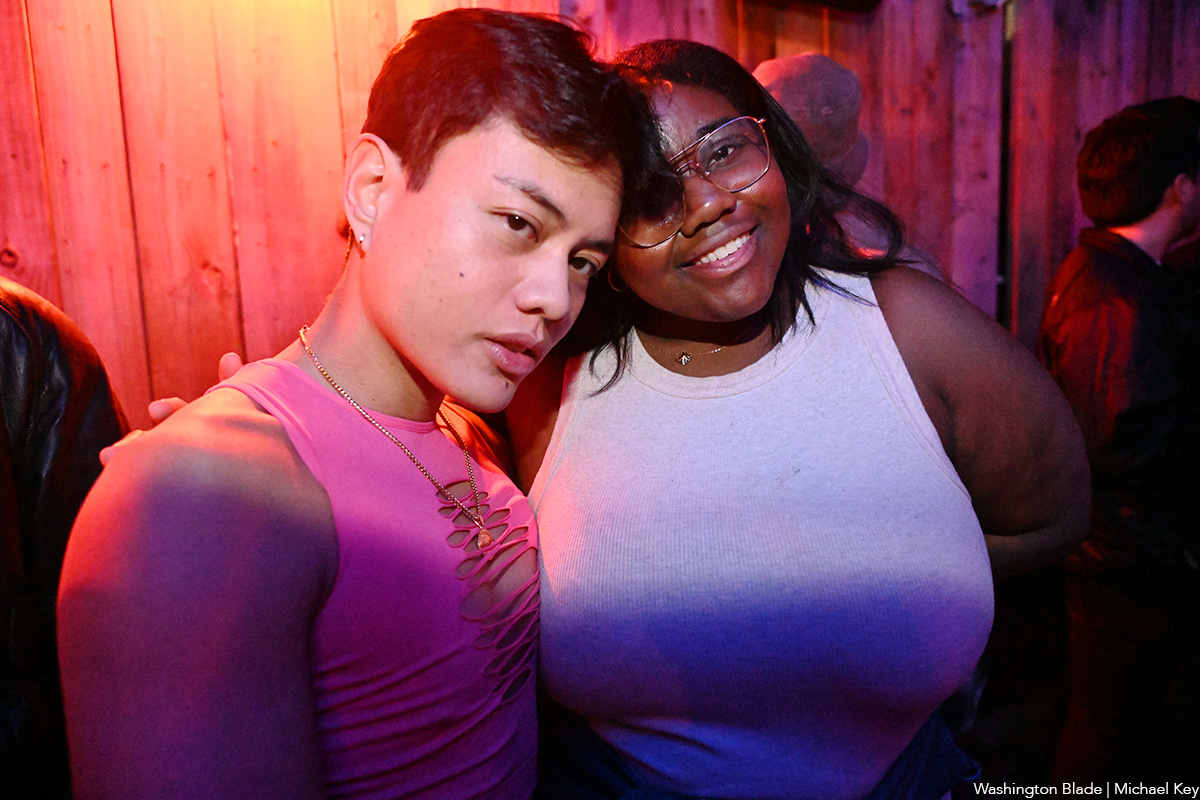
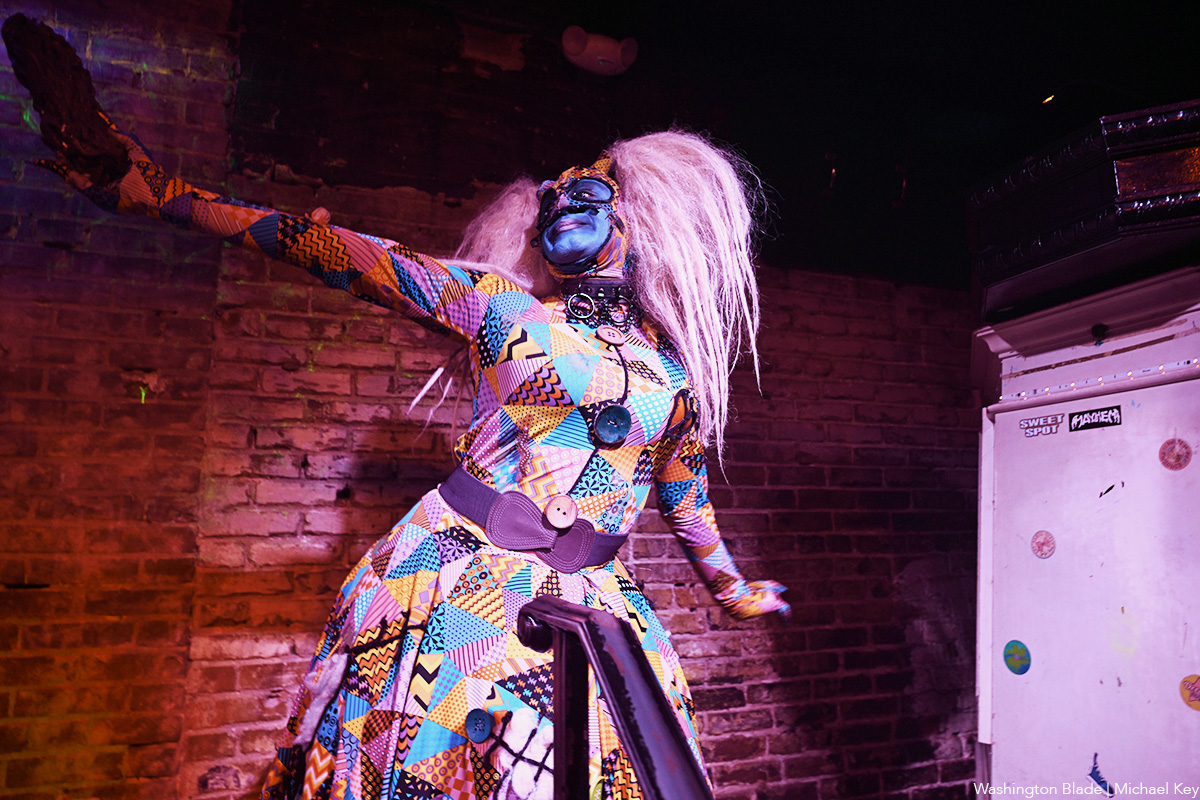
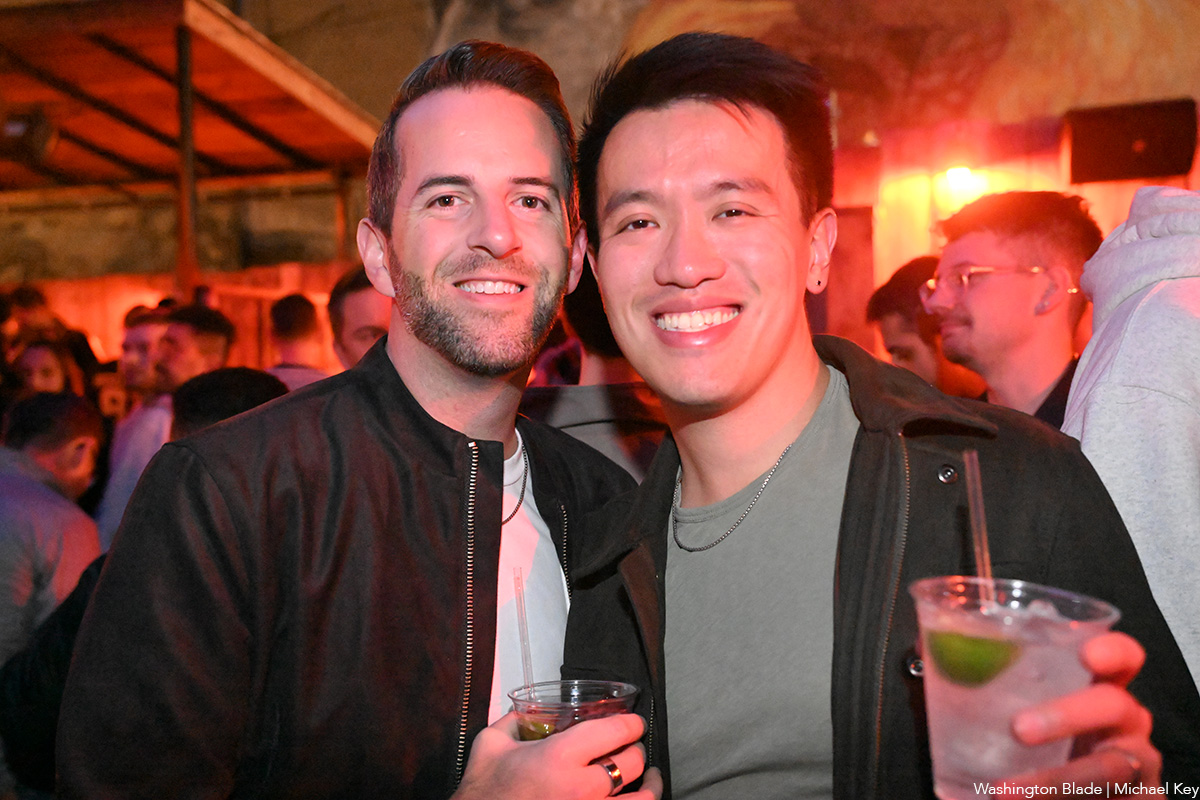
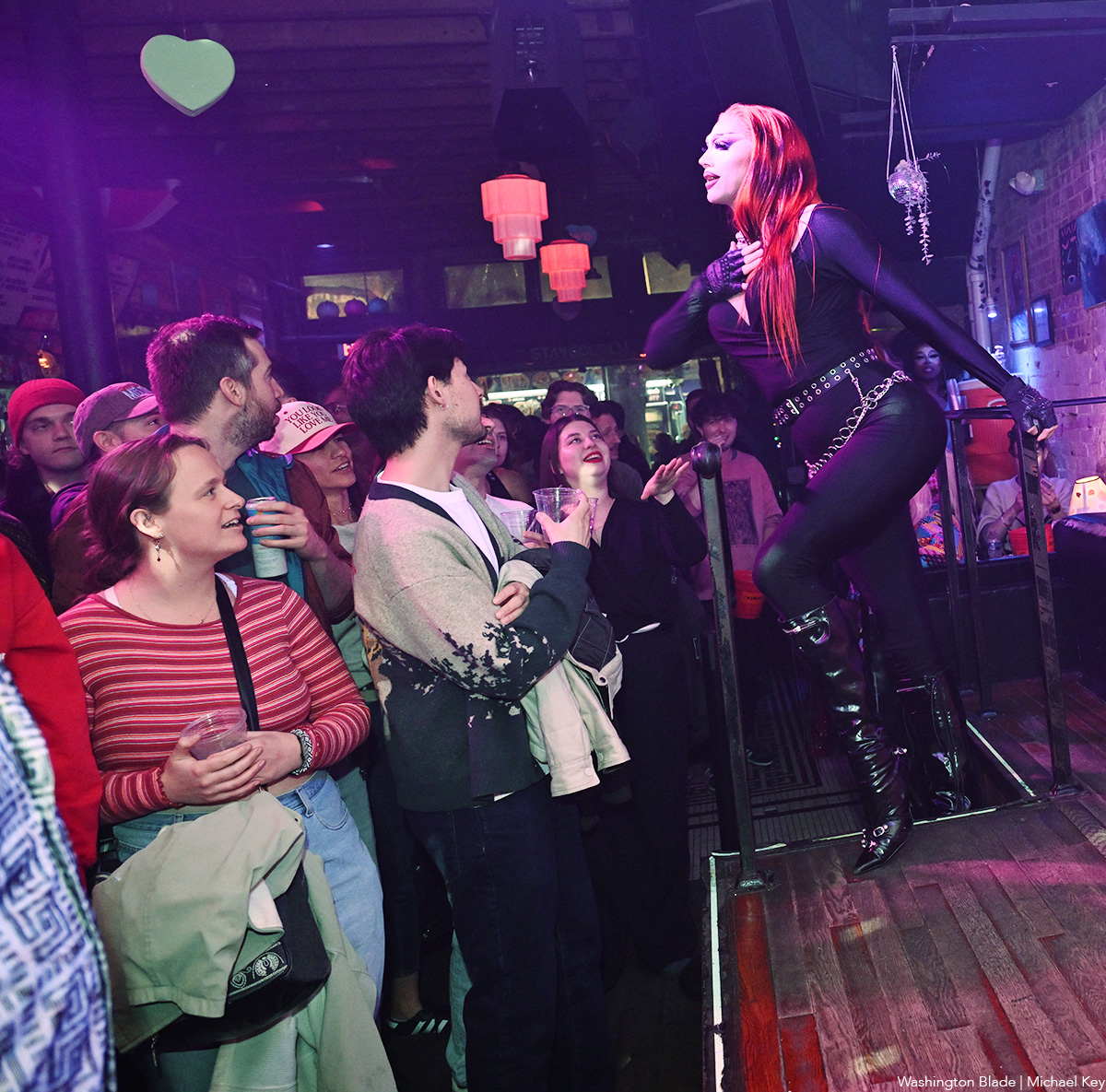
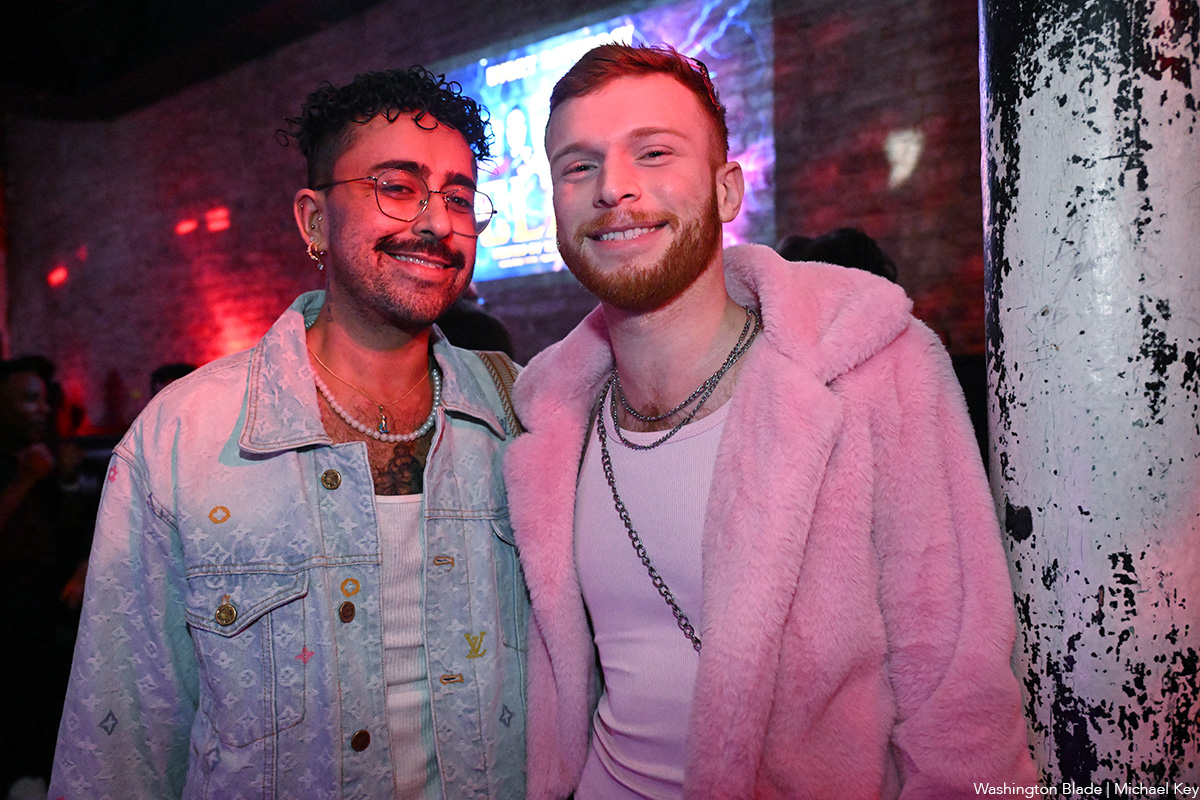
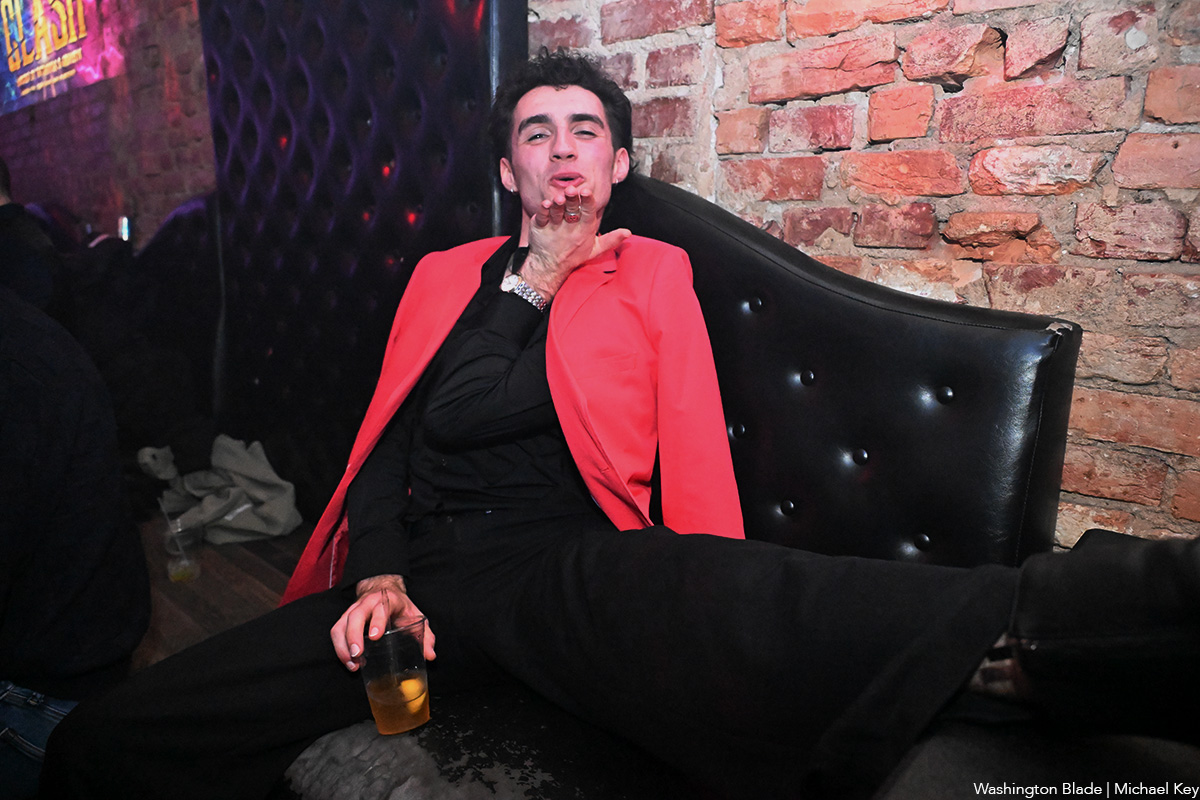
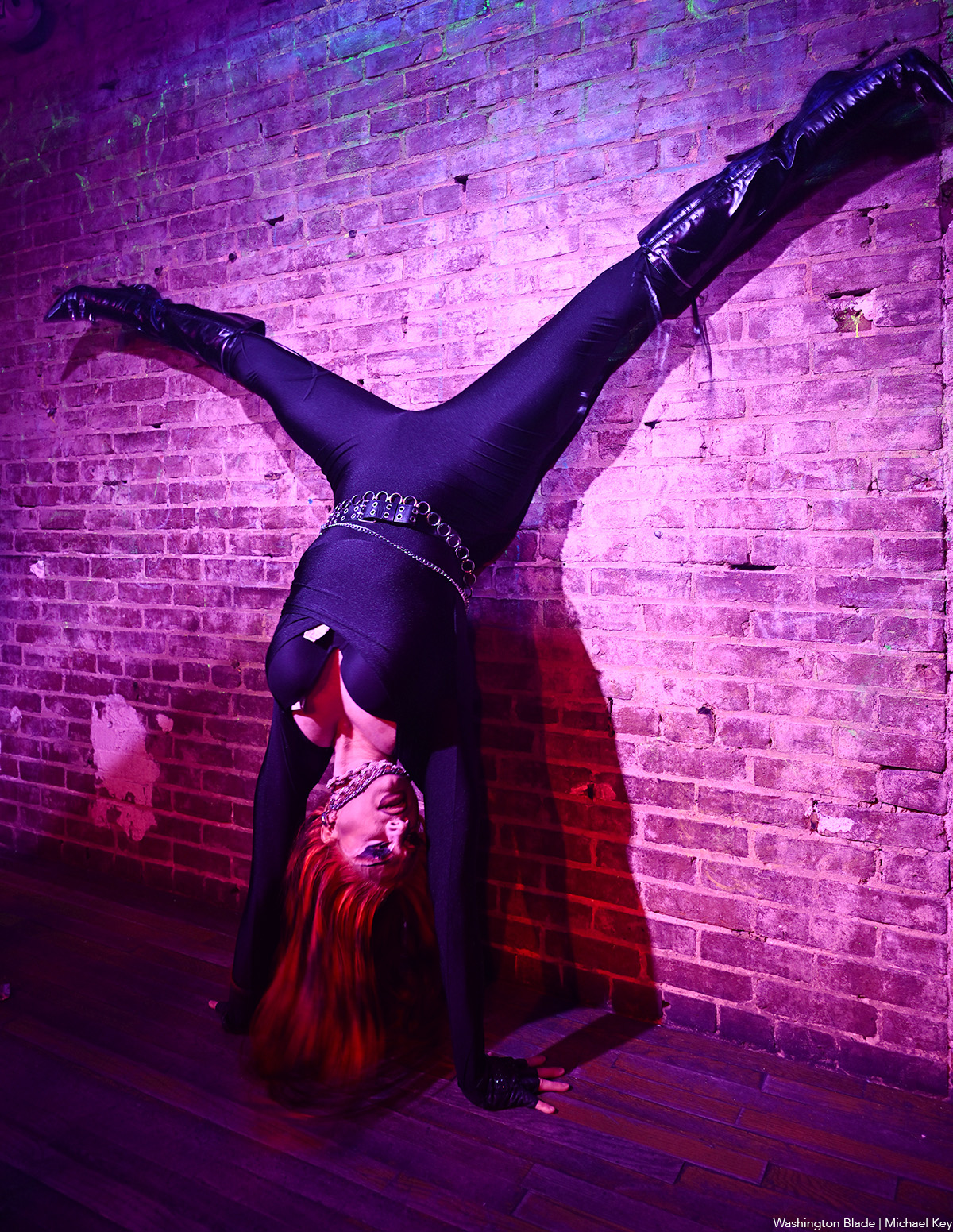
Theater
Magic is happening for Round House’s out stage manager
Carrie Edick talks long hours, intricacies of ‘Nothing Up My Sleeve’

‘Nothing Up My Sleeve’
Through March 15
Round House Theatre
4545 East-West Highway
Bethesda, Md. 20814
Tickets start at $50
Roundhousetheatre.org
Magic is happening for out stage manager Carrie Edick.
Working on Round House Theatre’s production of “Nothing Up My Sleeve,” Edick quickly learned the ways of magicians, their tricks, and all about the code of honor among those who are privy to their secrets.
The trick-filled, one-man show starring master illusionist Dendy and staged by celebrated director Aaron Posner, is part exciting magic act and part deeply personal journey. The new work promises “captivating storytelling, audience interaction, jaw-dropping tricks, and mind-bending surprises.”
Early in rehearsals, there was talk of signing a non-disclosure agreement (NDA) for production assistants. It didn’t happen, and it wasn’t necessary, explains Edick, 26. “By not having an NDA, Dendy shows a lot of trust in us, and that makes me want to keep the secrets even more.
“Magic is Dendy’s livelihood. He’s sharing a lot and trusting a lot; in return we do the best we can to support him and a large part of that includes keeping his secrets.”
As a production assistant (think assistant stage manager), Edick strives to make things move as smoothly as possible. While she acknowledges perfection is impossible and theater is about storytelling, her pursuit of exactness involves countless checklists and triple checks, again and again. Six day weeks and long hours are common. Stage managers are the first to arrive and last to leave.
This season has been a lot about learning, adds Edick. With “The Inheritance” at Round House (a 22-week long contract), she learned how to do a show in rep which meant changing from Part One to Part Two very quickly; “In Clay” at Signature Theatre introduced her to pottery; and now with “Nothing Up My Sleeve,” she’s undergoing a crash course in magic.
She compares her career to a never-ending education: “Stage managers possess a broad skillset and that makes us that much more malleable and ready to attack the next project. With some productions it hurts my heart a little bit to let it go, but usually I’m ready for something new.”
For Edick, theater is community. (Growing up in Maryland, she was a shy kid whose parents signed her up for theater classes.) Now that community is the DMV theater scene and she considers Round House her artistic home. It’s where she works in different capacities, and it’s the venue in which she and actor/playwright Olivia Luzquinos chose to be married in 2024.
Edick came out in middle school around the time of her bat mitzvah. It’s also around the same time she began stage managing. Throughout high school she was the resident stage manager for student productions, and also successfully participated in county and statewide stage management competitions which led to a scholarship at the University of Maryland, Baltimore County (UMBC) where she focused on technical theater studies.
Edick has always been clear about what she wants. At an early age she mapped out a theater trajectory. Her first professional gig was “Tuesdays with Morrie” at Theatre J in 2021. She’s worked consistently ever since.
Stage managing pays the bills but her resume also includes directing and intimacy choreography (a creative and technical process for creating physical and emotional intimacy on stage). She names Pulitzer Prize winning lesbian playwright Paula Vogel among her favorite artists, and places intimacy choreographing Vogel’s “How I learned to Drive” high on the artistic bucket list.
“To me that play is heightened art that has to do with a lot of triggering content that can be made very beautiful while being built to make you feel uncomfortable; it’s what I love about theater.”
For now, “Nothing Up My Sleeve” keeps Edick more than busy: “For one magic trick, we have to set up 100 needles.”
Ultimately, she says “For stage managers, the show should stay the same each night. What changes are audiences and the energy they bring.”
-

 Theater5 days ago
Theater5 days agoMagic is happening for Round House’s out stage manager
-

 Baltimore3 days ago
Baltimore3 days ago‘Heated Rivalry’ fandom exposes LGBTQ divide in Baltimore
-

 Real Estate3 days ago
Real Estate3 days agoHome is where the heart is
-

 District of Columbia3 days ago
District of Columbia3 days agoDeon Jones speaks about D.C. Department of Corrections bias lawsuit settlement

